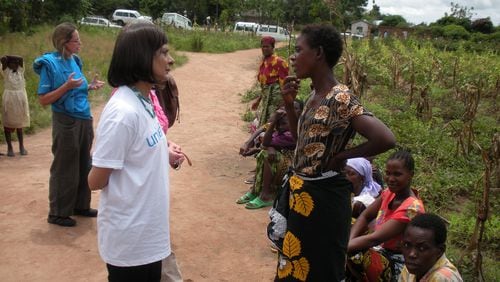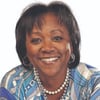It's hard to believe that in 2016, there are still people, including politicians, who question the value of vaccinating children.
It’s harder still to think that there are places in the world where if it weren’t for organizations like UNICEF, the United Nations Children’s Fund, hundreds of thousands of children wouldn’t have access to these lifesaving immunizations.
If that has you still struggling, consider Dr. Gulshan Harjee, president and CEO of First Medical Care Inc. in Decatur. Even at age 63, she's the human face of the lingering problem, the tangible evidence that what UNICEF does works long after it administers vaccines to children around the world.
And sometimes, what goes around comes around.
Dr. Harjee, at least, is seeing to it.
Indeed, not a day goes by that she isn’t reminded of not just how important vaccinations are but what they have meant to her in her own life.
Harjee was born and raised in Karanga, a small village of 1,000 people just outside Moshi in Tanzania, where UNICEF workers traveled on bicycles to distribute vaccines to residents.
“The best part was the candy they’d give us after we got our drops,” she recalled.
At the time, Harjee was 7. Her two siblings were 3 and 5.
“We saw the passion and lifesaving activities that UNICEF did for us,” she said.
In addition to vaccinations, the workers distributed powdered milk, books and pencils several times a year.
By 1971, Tanzania was in the midst of war, and Harjee's father made the hard decision to send her to Pakistan, where she saw children suffering from polio and being cared for by, yep, UNICEF workers.
When war broke out a year later between India and Pakistan, Harjee was forced to flee once more. This time, it was to Iran, where she enrolled in college to pursue the dream she’d held since age 6, when her grandmother was diagnosed with cancer.
She was midway through her second year of medical school at Pahlavi University when it dawned on her that UNICEF, which is celebrating its 70th anniversary this year, was everywhere — more than 190 countries at last count.
But Harjee wouldn’t be able to remain in Iran either. In 1979, in the midst of the Iranian embargo, she left for the United States and settled in Atlanta.
Within months of her arrival, she began applying to medical schools, 300 in total. If she didn’t get in, she’d revert to plan B, hopefully parlaying her CPR and language skills — she spoke six different ones — into becoming a flight attendant.
It wasn’t necessary.
“I started the second year over again, which was perfect for me,” she said. “It was a new two-year school and I was able to transfer to Emory and receive my MD finally in 1982.”
By then, philanthropy already loomed large in Harjee’s life, and not just during the giving season, something she attributes to witnessing UNICEF in action.
Harjee’s grandmother was just 30 when her husband died of tuberculosis, leaving her with two small children, including Harjee’s father, who was 5.
“They lived in a hut and she sold cigars in the streets of Dar es Salaam,” Harjee said. “It was my dad’s dream to be a doctor, but that didn’t happen. He became a bookkeeper instead. My mother was a seamstress. To think that in one generation I could be here is really something. I’m humbled every day I think about my own story. The Lord has been gracious.”
Even in her life in the U.S., Harjee has faced challenges.
Her first husband, Dean Delawalla, was one of 13 people killed in 1999 when a day trader tore through two stock brokerages in the Buckhead financial district and left her with two small children to raise. Then eight years ago, she was diagnosed with breast cancer.
“Each time I encounter a curve ball, I’m able to get up and get going again,” she said.
For that reason and because she knows that we all have a limited time on Earth, Harjee said she has no other choice but to give.
And so she has, establishing two scholarship endowments — one for first-year students at the Morehouse School of Medicine and another for college-bound high school students. Harjee also co-founded the Clarkston Community Health Center, a comprehensive free clinic that provides both dental and mental health care to the indigent, uninsured and underinsured residents of Clarkston and surrounding communities. The clinic is staffed by volunteer doctors, including Harjee, who can be found there most Saturdays and Sundays.
Since becoming a member of the U.S. Fund for UNICEF Southeast Regional Board in 2008, Harjee has personally hosted four UNICEF events, helping to raise over $140,000 for UNICEF’s work in Pakistan. All told, she has raised more than $700,000 to support the organization’s work, enough to vaccinate 1,891,876 children against measles.
She is a true hero to us, said Jeremy Cole, managing director of the U.S. Fund for UNICEF’s Southeast Region.
“We believe in a world where children shouldn’t have to suffer because of the place of their birth, and every child has the right to thrive, develop and dream,” Cole said. “UNICEF relies on individual supporters like Gulshan. They are our lifeblood and allow us to make significant contributions.”
Early this month, Harjee hosted UNICEF’s global director of polio eradication, Reza Hossaini, at her home, where he talked about how just a few short decades ago, 350,000 people contracted polio annually.
“This year, there have been 28 cases globally,” Cole said. “We’re hopeful we’re just a few years away from total eradication. That’s the kind of progress Gulshan’s leadership on our board has helped to make.”
But challenges remain. A UNICEF report released a few months ago noted there are some 50 million children on the run, displaced from their homes by war and political conflict.
“We can’t close our eyes to the needs of children simply because they aren’t in our backyard,” Cole said. “Only 4 percent of charitable giving in this country goes to global causes, and yet look at what these investments are doing: eradicating disease from the planet, cutting in half the under-5 child mortality rate in a few decades, providing hundreds of millions of children with access to clean water since 1990. If we gave just 10 cents on the dollar to invest in the world’s children, imagine the kind of world we could create together.”
You’ll get no argument about that from Dr. Gulshan Harjee. When you allay the suffering of others, you’re healed, she said.
If nothing else, she has spent her best years doing what Albert Einstein said we’re all obligated to do — putting back into the world at least the equivalent of what we take out of it.
About the Author







